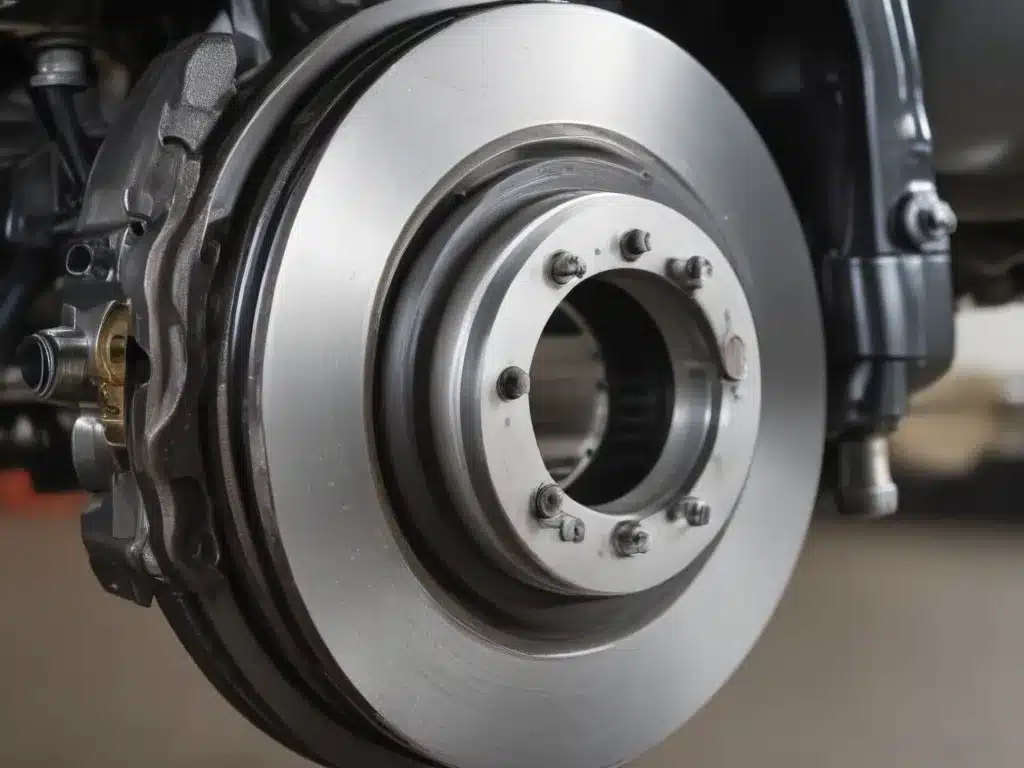
The Importance of Proper Brake Fluid Maintenance
I’ll admit it – I’m a bit of a car geek. Ever since I was a kid, I’ve been fascinated by the inner workings of automobiles. But you know what’s always been a bit of a mystery to me? Brake fluid. I mean, it’s this unassuming liquid that plays such a crucial role in keeping us safe on the road, but how many of us really understand its importance?
Well, that’s all about to change. Today, I’m going to dive deep into the world of brake fluid and show you why proper maintenance is absolutely essential for keeping your brakes in tip-top shape. Get ready for a wild ride, folks!
Understanding Brake Fluid: The Lifeblood of Your Brakes
Let’s start with the basics. Brake fluid is a hydraulic fluid that transmits the force from your brake pedal to the brake calipers, which in turn apply pressure to the brake pads and stop your wheels from spinning. Think of it as the circulatory system of your braking system – without it, your brakes wouldn’t work at all.
But brake fluid is more than just a simple liquid. It’s a highly specialized chemical compound that has to withstand some pretty extreme conditions. We’re talking temperatures ranging from sub-zero to well over 400°F, not to mention the constant pressure and vibration it’s subjected to. And let’s not forget about that nasty stuff called water that can find its way into the system, causing all sorts of problems.
The Dangers of Neglecting Brake Fluid
So what happens if you ignore your brake fluid? Well, my friend, the consequences can be downright scary. As the fluid ages and gets contaminated, it starts to lose its ability to effectively transmit the force from your foot to the calipers. This means your brakes will start to feel spongy and unresponsive, putting you and your passengers at risk.
But that’s not all. Over time, the water that seeps into the system can cause the fluid to boil, leading to a complete brake failure. Imagine cruising down the highway and suddenly losing all braking power – yikes! And let’s not forget about the increased risk of corrosion and wear on your brake components, which can lead to even more expensive repairs down the road.
Keeping Your Brakes in Tip-Top Shape
Alright, now that I’ve scared the daylights out of you, let’s talk about how to keep your brakes in prime condition. The key, as you’ve probably guessed, is regular brake fluid maintenance.
The recommended interval for changing your brake fluid can vary depending on your vehicle, but a good rule of thumb is to do it every 2-3 years or 30,000 miles. This may seem like a hassle, but trust me, it’s a small price to pay for the peace of mind of knowing your brakes are always ready to perform when you need them most.
Brake Fluid Maintenance: A Step-by-Step Guide
Now, I know what you’re thinking – “But I’m not a mechanic! How am I supposed to change my own brake fluid?” Fear not, my friend, because I’m about to walk you through the process step-by-step.
First things first, you’ll need to gather your supplies. You’ll need a brake fluid vacuum bleeder, a few clean containers to catch the old fluid, some new brake fluid that meets your vehicle’s specifications, and a few rags to keep things tidy.
Once you’ve got everything ready, it’s time to get to work. Start by locating the brake fluid reservoir, usually under the hood near the master cylinder. Carefully remove the cap and use the vacuum bleeder to suck out the old fluid. Be sure to dispose of it properly – brake fluid is nasty stuff and can be harmful to the environment.
Next, it’s time to flush the system. Use the vacuum bleeder to draw in new fluid, starting with the wheel farthest from the master cylinder and working your way towards the closest one. Keep an eye on the fluid level in the reservoir and top it up as needed.
Finally, take your car for a test drive and make sure the brakes feel firm and responsive. If not, you may need to bleed the system again to remove any air bubbles.
The Benefits of Regular Brake Fluid Changes
Now, I know what you might be thinking – “Do I really need to do this every couple of years? Seems like a lot of work for just a little fluid.” But trust me, the benefits of regular brake fluid maintenance far outweigh the hassle.
First and foremost, it’s a matter of safety. Properly maintained brakes can mean the difference between a fender-bender and a catastrophic accident. And let’s not forget about the cost savings – by keeping your brake system in top shape, you can avoid expensive repairs down the road.
But the benefits don’t stop there. Regular brake fluid changes can also improve the overall performance of your brakes, making them feel more responsive and giving you the confidence to tackle any driving situation.
Conclusion: Don’t Neglect Your Brake Fluid
Alright, folks, we’ve covered a lot of ground today, but I hope I’ve convinced you of the importance of proper brake fluid maintenance. Remember, your brakes are the most crucial safety feature on your vehicle, and keeping them in prime condition should be a top priority.
So, the next time you’re due for a brake fluid change, don’t put it off. Grab your tools, roll up your sleeves, and get to work. Your future self (and your passengers) will thank you.
And if you’re ever in the market for some top-notch car maintenance and oil change services, be sure to check out AutoOilAndFluid.com. They’ve got the expertise and the equipment to keep your ride running like a dream.
Happy driving, my friends!


